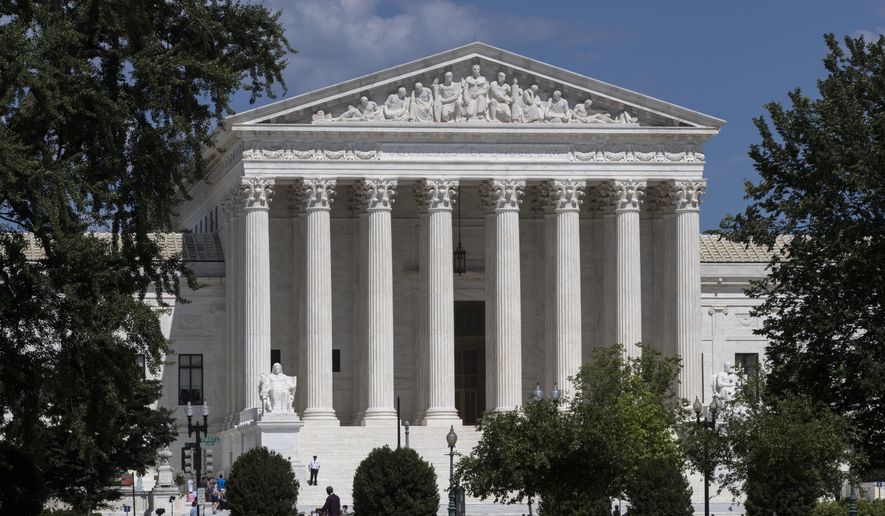Former President Donald Trump has told the Supreme Court ahead of oral arguments this week that he should stay on the 2024 ballot because he’s the leading Republican candidate for president and the people — not the courts — should decide who is eligible.
He also cautioned about socialist countries that exclude opposition parties, saying the U.S. should not be like Venezuela.
Monday’s court filing came just 72 hours before the justices will hear arguments over Section 3 of the 14th Amendment, which bars anyone who participated in an insurrection or rebellion from holding office. Critics have pointed to the insurrection clause to keep Mr. Trump off the ballot in Colorado.
“He is the presumptive Republican nominee and the leading candidate for President of the United States. In our system of ‘government of the people, by the people, [and] for the people,’ the American people — not courts or election officials — should choose the next President of the United States,” Mr. Trump’s lawyers said in the filing.
The challenge was initially brought by a group of Colorado voters, led by Norma Anderson, and they’re represented by Citizens for Responsibility and Ethics, a left-of-center advocacy group in Washington. They contend Mr. Trump is disqualified from holding office because of the U.S. Capitol riot on Jan. 6, 2021.
Mr. Trump’s lawyers say the voters’ move is anti-democratic.
“Yet at a time when the United States is threatening sanctions against the socialist dictatorship in Venezuela for excluding the leading opposition candidate for president from the ballot, respondent Anderson asks this Court to impose that same anti-democratic measure at home. To date, at least 60 state and federal courts throughout the country have refused to remove President Trump from the ballot. The Colorado Supreme Court is the lone outlier,” Mr. Trump’s brief reads.
At issue is the 14th Amendment, which prohibits someone from holding a U.S. office if they, while serving an officer, engaged in insurrection or rebellion or gave aid or comfort to an enemy of the Constitution.
Mr. Trump has been challenged under the insurrection section, with opponents saying his behavior surrounding the 2020 election qualifies for sanction.
The Colorado Supreme Court in December ruled that the secretary of state there must remove Mr. Trump’s name from the ballot for the March primary. Mr. Trump appealed to the U.S. Supreme Court, which will hear the case on Thursday.
A ruling from the high court could come soon after oral arguments, given the time-sensitive nature of the dispute and looming primaries. Colorado’s primary is slated for March 5.
A quick decision is not unprecedented. In 2000, the high court issued a ruling in Bush v. Gore the day after oral arguments were held.
The insurrection clause reads: “No person shall be a Senator or Representative in Congress, or elector of President and Vice-President, or hold any office, civil or military, under the United States, or under any State, who, having previously taken an oath, as a member of Congress, or as an officer of the United States, or as a member of any State legislature, or as an executive or judicial officer of any State, to support the Constitution of the United States, shall have engaged in insurrection or rebellion against the same, or given aid or comfort to the enemies thereof.”
• Stephen Dinan contributed to this report.
• Alex Swoyer can be reached at aswoyer@washingtontimes.com.




Please read our comment policy before commenting.